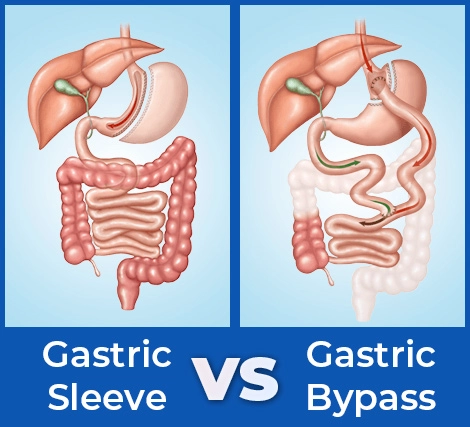Gastric Sleeve vs. Gastric Bypass: Understanding The Differences And Benefits
Obesity has become a major health issue in the world, leading to various health complications such as diabetes, heart disease, and high blood pressure. Weight loss surgery is an effective solution for those who have tried traditional weight loss methods without success. Two popular weight loss surgeries are gastric sleeve and gastric bypass. In this article, we’ll explore the differences and benefits of these two procedures.
What is Gastric Sleeve Surgery?
Gastric sleeve surgery, also known as sleeve gastrectomy, is a surgical weight loss procedure that involves removing a portion of the stomach to create a smaller stomach pouch. The remaining stomach is shaped like a sleeve or a tube, hence the name gastric sleeve. The smaller stomach size leads to a feeling of fullness with smaller portions of food, resulting in weight loss.
What is Gastric Bypass Surgery?
Gastric bypass surgery, also known as Roux-en-Y gastric bypass, is a surgical weight loss procedure that involves creating a small stomach pouch and rerouting the digestive tract. The surgeon staples the upper part of the stomach, creating a smaller pouch that is then connected directly to the small intestine, bypassing the remaining stomach and part of the small intestine. The smaller stomach size and altered digestive tract lead to a feeling of fullness and reduced absorption of calories and nutrients, resulting in weight loss.
Difference between Gastric Sleeve and Gastric Bypass
1. Stomach size reduction
The primary difference between gastric sleeve and gastric bypass is how the stomach is reduced in size. Gastric sleeve surgery involves removing a portion of the stomach to create a smaller stomach pouch, while gastric bypass surgery involves stapling the upper part of the stomach to create a smaller pouch and rerouting the digestive tract.
2. Nutrient absorption
Gastric bypass surgery involves bypassing a portion of the small intestine, leading to reduced absorption of calories and nutrients. This can lead to a higher risk of vitamin and mineral deficiencies, which requires ongoing monitoring and supplementation. In contrast, gastric sleeve surgery does not alter the digestive tract, and there is less risk of nutrient deficiencies.
3. Weight loss results
Both gastric sleeve and gastric bypass surgeries result in significant weight loss. However, gastric bypass surgery typically leads to more weight loss in the first year, while gastric sleeve surgery leads to slow but steady weight loss over a longer period.
Benefits of Gastric Sleeve and Gastric Bypass
1. Improved health
Weight loss surgery can improve various health conditions related to obesity, such as diabetes, high blood pressure, and sleep apnea.
2. Sustainable weight loss
Gastric sleeve and gastric bypass surgeries lead to sustained weight loss, resulting in improved quality of life and reduced risk of obesity-related health complications.
3. Increased self-confidence
Weight loss surgery can improve self-confidence and self-esteem, leading to a better quality of life.
Conclusion
Gastric sleeve and gastric bypass surgeries are both effective weight-loss solutions for those who have struggled with traditional weight-loss methods. While they have similarities, such as significant weight loss and improved health outcomes, they also have differences in how the stomach is reduced in size and the potential for nutrient deficiencies. Consulting with a qualified healthcare professional is essential in deciding which procedure is the best option for each individual.




